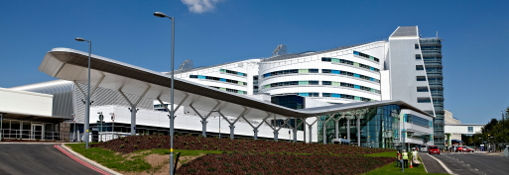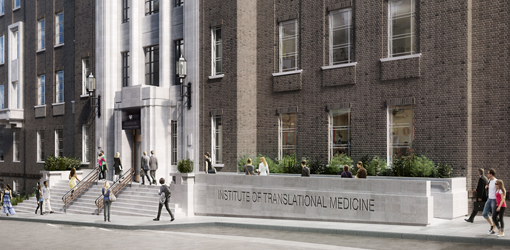With so much research and clinical expertise co-located in the same place, there is nowhere quite like Birmingham when it comes to translational medicine, as Ros Dodd discovers.
The skyline of South West Birmingham is dominated by the University of Birmingham’s elegantly slender Victorian clock tower juxtaposed with the three chunkier, funkier-looking towers of the Queen Elizabeth ‘super hospital’. It is a fitting vista; for the University, steeped in more than a century of eminent medical research, and the hospital, the second-largest in the UK and one of the country’s ‘centres of excellence’, together constitute the beating heart of one of the world’s outstanding and pioneering biomedical hubs.
For decades, academics from the University have worked alongside top clinicians at the QE to translate world-leading research into world-class healthcare. Now, Birmingham’s biomedical campus is stepping up to a new, even more exciting level with the opening of the Biomedical Innovation Hub and the Institute of Translational Medicine (ITM).The first integrated, stand-alone dental hospital and dental school in the For almost 40 years is due to open, a short distance away, this autumn, while over the next few years, a largely derelict site adjacent to campus, Battery Park, will be transformed into a Life Sciences hub.
‘What makes Birmingham exceptional is that everything is on one campus,’ explains Professor David Adams, Dean of Medicine and incoming Head of the College of Medical and Dental Sciences. ‘We have some of the best brains in the world and some of the best facilities in the world –all on one relatively small site.
 ‘Across the University, there is outstanding basic discovery science co-located with one of the largest and most modern hospitals in Europe, with fantastic translational facilities such as the Wellcome Trust Clinical Research Trust Facility – one of the most successful in the country – and facilities for cell and gene therapy, and a world-leading clinical trials unit. All this is greatly reinforced byte development of the ITM, which has the aim of bringing patients and clinical academics together in one building, where there will be embedded space for industry, clinical and bioinformatics experts and strategic medicine.
‘Across the University, there is outstanding basic discovery science co-located with one of the largest and most modern hospitals in Europe, with fantastic translational facilities such as the Wellcome Trust Clinical Research Trust Facility – one of the most successful in the country – and facilities for cell and gene therapy, and a world-leading clinical trials unit. All this is greatly reinforced byte development of the ITM, which has the aim of bringing patients and clinical academics together in one building, where there will be embedded space for industry, clinical and bioinformatics experts and strategic medicine.
‘Added to that, there is the BioHub and BizzInn, and over the next few years we will be developing the Battery Park to expand our Life Sciences facilities. So we have all the pieces in place to go all the way through from discovery science to preclinical modelling to experimental medicine to clinical trials to spin-out companies.’
As well as great minds and great facilities, Birmingham’s biomedical campus sits within the West Midlands region, home to nearly six million people and the most ethnically diverse population outside London. ‘This is the heart of an academic science network that brings together facilities such as hospitals and HCIs (human–computer interaction centres); so there are opportunities to roll things out to the broader community,’ adds Professor Adams, who is Professor of Hepatology.
‘There is nowhere else with a campus quite like this one – nowhere with everything-located in one place surrounded by such a population, so that you have access to patients and patient samples. These are exceptional facilities offering unique opportunities to deliver translational research. It really is a biomedical one-stop shop.’
BioHub nurtures fledgling talent
The Biomedical Innovation Hub (known as The BioHub Birmingham) opened last month. First to the bench was NanoTi, fledgling Hungarian company specialising in surface treatment for titanium dental and orthopaedic implants to combat infection.
The new facility, a £7 million investment by the University in conjunction with the European Regional Development Fund, provides entrepreneurs and innovative start-ups in the biomedical field with access to affordable laboratory facilities and highest-specification equipment. Business Development Manager Helen Miller-Viney explains: ‘The ground floor of The BioHub is the first phase to open and offers a large area of bench space, with 24 Lab Stations. In addition, there are high-specification laboratories for performing tissue cell culture, microbiology and microscopy, and it will enable entrepreneurs with a low budget or who are looking for funding to come and share facilities.’
A key forerunner of the BioHub project is the University’s business incubator,BizzInn, which offers a wide range of support to young med-tech and life science companies, from sourcing funding to arranging mentorships from local firms.

A truly translational medical agenda
The Institute of Translational Medicine (ITM) will put Birmingham and the West Midlands region at the forefront of translational medicine in the UK.
Due to open this year, the Institute will provide a world-class clinical research base that will dramatically expand therapeutic options for patients with life-threatening conditions, such as cancer and liver disease, by accelerating access to new diagnostics, drugs and medical devices.
The £24 million development, led by Birmingham Health Partners, will speed up the rate at which research can improve patient outcomes by using multi-disciplinary, highly collaborative bench-to-bedside approach.
The ITM, based in two refurbished buildings on the QE Hospital campus, will house 600 clinical triallists and create a focus on Life Sciences in Birmingham and the West Midlands – one of the largest population catchment regions in Europe.
Building on Birmingham’s renowned clinical trials expertise, the centre will provide increased capacity to allow more patients to be located alongside clinicians and researchers.
It will also make it easier for both SME and large pharma and biotechnology firms to work more closely with clinicians and academics, bringing more investment to Birmingham – one of the very few global cities able to deliver such a translational medicine agenda.
This article first appeared in Birmingham Global, a supplement of The Chronicle of Higher Education.